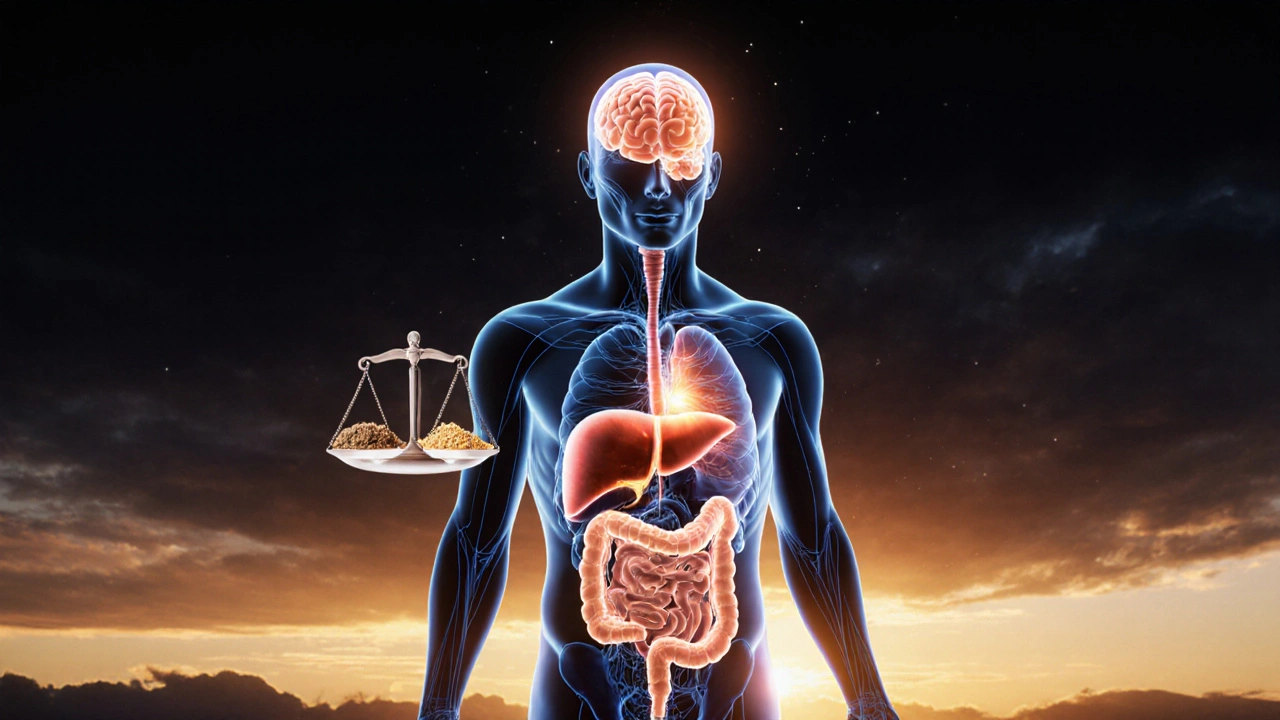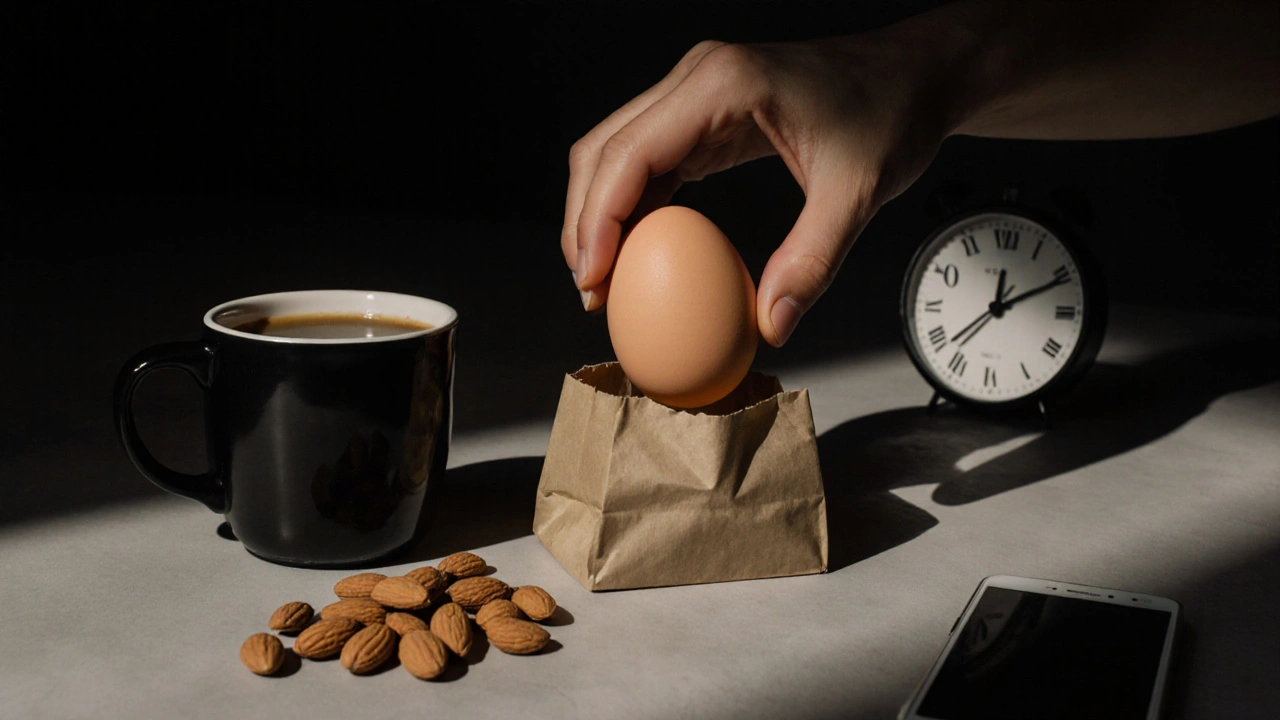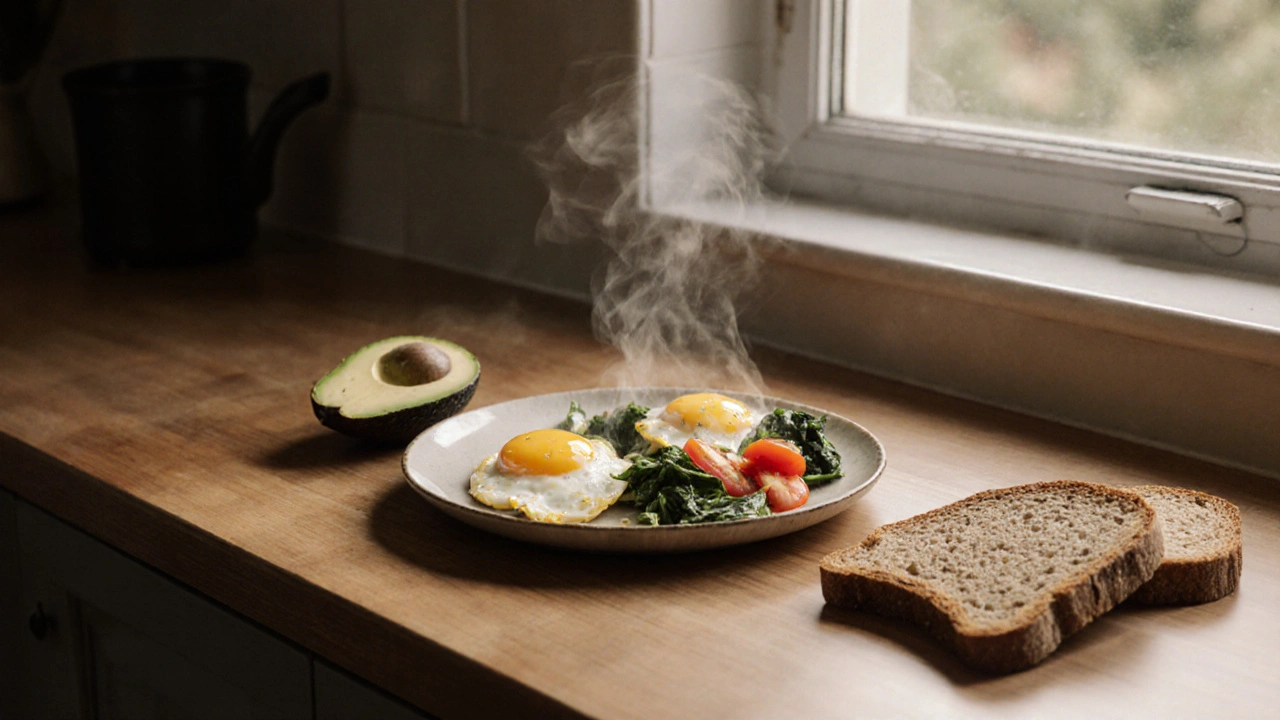Breakfast Nutrition Checker
Is Your Breakfast Balanced?
Check if your breakfast contains all three essential components for a healthy start to your day:
Skipping breakfast doesn’t make you leaner. It just makes you hungrier-later. And when that hunger hits, you’re more likely to grab something sugary, salty, or fried. That’s not a diet. That’s a cycle. A healthy breakfast isn’t about fancy smoothie bowls or Instagram-worthy toast. It’s about giving your body what it needs to start the day right-and keep your whole diet on track.
Your Body Isn’t Sleeping, Even If You Are
While you were asleep, your body was working. Your liver was releasing glucose to keep your brain running. Your muscles were repairing. Your metabolism never hit pause. By the time you wake up, your blood sugar is low. If you don’t eat, your body thinks it’s in survival mode. It starts holding onto fat and slowing down your metabolism to conserve energy. That’s the opposite of what you want if you’re trying to eat well.
Studies show that people who eat a balanced breakfast have better insulin sensitivity throughout the day. That means less sugar spikes, fewer cravings, and more stable energy. A 2023 analysis of over 12,000 adults found that those who ate breakfast regularly were 37% less likely to develop type 2 diabetes than those who skipped it. This isn’t about willpower. It’s about biology.
What Makes a Breakfast Actually Healthy?
Not all breakfasts are created equal. A bowl of sugary cereal with milk? That’s a sugar hit followed by a crash. A pastry and coffee? You’ll be hungry again by 10 a.m. A healthy breakfast has three things: protein, fiber, and healthy fats.
Protein keeps you full longer. It stabilizes blood sugar. Think eggs, Greek yogurt, cottage cheese, tofu, or even leftover chicken from last night’s dinner. Fiber slows digestion and keeps your gut happy. Oats, berries, chia seeds, whole grain bread, and vegetables all count. Healthy fats-like avocado, nuts, or olive oil-help your body absorb nutrients and keep your brain sharp.
Here’s what a real healthy breakfast looks like:
- Two scrambled eggs with spinach and tomato, served with half an avocado and a slice of whole grain toast
- Plain Greek yogurt with a handful of blueberries, a tablespoon of almonds, and a sprinkle of flaxseed
- Oatmeal made with water or unsweetened almond milk, topped with sliced pear and a spoonful of peanut butter
None of these require fancy ingredients. None of them take more than 10 minutes. And none of them leave you reaching for a snack before lunch.
How Breakfast Shapes Your Whole Day
What you eat in the morning sets the tone for everything else. If you start with a sugary breakfast, your body floods with insulin. That causes a crash a few hours later. That crash makes you crave more sugar. That’s how you end up with a mid-morning muffin, an afternoon candy bar, and a heavy dinner.
But if you start with protein and fiber? Your hunger stays steady. You’re less likely to overeat at lunch. You’re less likely to snack mindlessly. A 2024 study from the University of Sydney tracked 800 people for six weeks. Those who ate a high-protein breakfast consumed 400 fewer calories per day on average-not because they were trying to diet, but because they weren’t starving by noon.
It’s not magic. It’s control. A healthy breakfast gives you control over your appetite. And when you have control over your appetite, you have control over your diet.

Breakfast and Mental Clarity
Ever feel foggy after skipping breakfast? That’s not just in your head. Your brain runs on glucose. Without it, focus drops, reaction times slow, and decision-making gets worse. A 2022 study from the University of Cambridge found that students who ate breakfast performed 15% better on memory and attention tests than those who didn’t.
It’s the same for adults. People who eat breakfast regularly report better mood, lower stress, and improved productivity. That’s not because they’re more disciplined. It’s because their brains have the fuel they need. You wouldn’t run a car on empty. Why would you run your brain that way?
Breaking the ‘I Don’t Have Time’ Myth
The biggest excuse for skipping breakfast? “I don’t have time.” But how much time does it really take? Boiling an egg? Three minutes. Scooping yogurt into a bowl? One minute. Spreading peanut butter on toast? Two minutes. That’s six minutes total. Less time than scrolling through your phone before getting out of bed.
Prep ahead. Hard-boil a batch of eggs on Sunday. Keep a container of Greek yogurt in the fridge. Buy pre-sliced fruit. Keep nuts and seeds in a small jar. Overnight oats? Mix oats, chia, milk, and fruit in a jar the night before. Grab it and go.
There’s no excuse. You have time. You just need to choose it.
What Happens When You Skip It
Skipping breakfast doesn’t just make you hungry. It messes with your hormones. Ghrelin, the hunger hormone, spikes. Leptin, the fullness hormone, drops. Your cortisol (stress hormone) stays elevated. That’s a recipe for anxiety, overeating, and weight gain.
People who skip breakfast regularly are more likely to have higher LDL (bad) cholesterol, higher blood pressure, and increased belly fat. That’s not because they eat more at night-it’s because their metabolism adapts to the pattern. Your body learns to store fat when food is unpredictable.
And it’s not just physical. Skipping breakfast is linked to higher rates of depression and irritability. Your brain needs steady fuel. Without it, your mood tanks.

It’s Not About Perfection
You don’t need to eat breakfast every single day to benefit. But if you want a balanced diet, you need to eat breakfast most days. Even if it’s small. Even if it’s just an apple with a handful of almonds. That’s better than nothing.
And if you’re not hungry in the morning? That’s normal. Your body might just need time to adjust. Start with a small portion. Drink water first. Wait 15 minutes. Then eat. You’ll find your appetite returns.
Think of breakfast like a foundation. You don’t need a castle. You just need a solid base. A healthy breakfast isn’t the whole diet. But without it, the rest of your eating habits are built on sand.
Real People, Real Results
Maria, 42, from Brisbane, used to skip breakfast because she said she wasn’t hungry. She’d grab a coffee and a croissant at work. By 11 a.m., she was crashing. She’d snack on chips and candy. By dinner, she was ravenous. She gained 12 kilos in a year.
She started with one change: two boiled eggs every morning. No toast. No butter. Just eggs. Within two weeks, her afternoon cravings disappeared. In three months, she lost 7 kilos-without counting calories or cutting out carbs. She didn’t change anything else. Just breakfast.
James, 28, a software developer, used to skip breakfast to “save time.” He’d work through lunch, then binge on takeout after 8 p.m. He started eating oatmeal with berries and chia seeds before work. Within a month, his afternoon brain fog lifted. He stopped ordering takeout. He saved money. He slept better.
They didn’t become nutritionists. They just ate something real in the morning. And that changed everything.
Final Thought: Breakfast Is a Habit, Not a Meal
A balanced diet isn’t about perfect meals. It’s about consistent choices. Breakfast is the first choice you make each day. It tells your body, “I’m going to take care of you.” And when your body believes that, it responds.
You don’t need to eat a five-star breakfast. You just need to eat something that fuels you-without crashing you. Protein. Fiber. Healthy fats. That’s it. Everything else is noise.
Try it for seven days. Just seven. Eat something real in the morning. See how you feel at 2 p.m. See if you still crave sugar. See if you sleep better. You might be surprised.
Is it okay to skip breakfast if I’m not hungry?
Yes, if you’re not hungry, it’s fine to wait. But don’t use that as an excuse to skip it forever. Your appetite can reset. Start small-a piece of fruit, a spoonful of nut butter, or a boiled egg. Drink water first. Wait 15 minutes. Often, hunger returns. If it doesn’t after a few days, listen to your body. But make sure your first meal of the day still includes protein and fiber.
Can I have coffee for breakfast?
Coffee alone isn’t breakfast. It’s a stimulant, not fuel. Drinking coffee without food can spike cortisol and make you feel jittery or anxious. It can also cause blood sugar drops later. If you drink coffee in the morning, pair it with something that has protein and fiber-like a boiled egg or a handful of almonds. Don’t make coffee your meal.
What if I’m trying to lose weight?
Skipping breakfast doesn’t help you lose weight. Studies show people who eat breakfast lose just as much weight-and keep it off longer-than those who skip it. A healthy breakfast reduces cravings and helps you eat fewer calories overall. Focus on protein and fiber-rich foods. Avoid sugary options. You’ll feel fuller longer and avoid overeating later.
Are smoothies a good breakfast?
Some are. Most aren’t. A smoothie made with fruit, yogurt, and a scoop of protein powder? Good. A smoothie made with banana, juice, and honey? That’s sugar in liquid form. It spikes your blood sugar fast and leaves you hungry again. If you drink smoothies, add chia seeds, flaxseed, nut butter, or spinach. And always include a protein source. Don’t drink your breakfast-eat it.
What’s the best time to eat breakfast?
Within two hours of waking up. That’s when your body is ready to process food. Eating too late-say, after 10 a.m.-can delay your metabolism and lead to overeating later. You don’t need to eat at 6 a.m. if you wake up at 8. But waiting until noon? That’s too long. Your body needs fuel to start the day.






